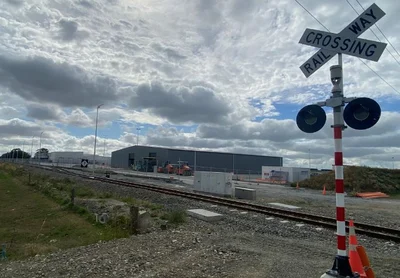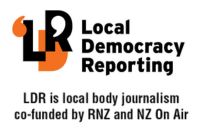Freight hub will ‘smooth the supply chain'

The $18m Fairfield Freight Hub is on track to be operational in April.
Once it’s up and running it is hoped it will start shaving costs for exporters.
Wareing Group director Mark Wareing said once it is up and running it should smooth out the supply chain and benefit farmers.
“It’s going to be good for the farmer but they won’t see it directly.
“It will be the exporter that gets the benefit through the supply chain, which should be passed on to the farmer.”
Exporters pay the freight so the savings are for the industry, not the farmer, he said.
“It will save the farmers at some point but to quantify that in dollar terms depends on several factors.”
The dry, hot summer after a mild winter has allowed contractors to seal the site, putting it on target to be operational before winter.
“It’s looking like mid-April rather than October.”
Moving the freight activities out of the centre of Ashburton will end the delays related to the shunting yards positioned next to one of the busiest intersections in town, with trains passing through town at a higher speed.
The improvement in traffic flows through Ashburton is expected to be only a minor benefit compared to the economic gains it offers.
It’s estimated that KiwiRail only carries around 12% of New Zealand’s freight, and the Fairfield Freight Hub is looking to boost those figures.
The hub will be processing around 20,000 containers per year, and moving the containers on rail will see a reduction of around 40,000 truck movements per year, Wareing said.
The aim is to reduce the costs out of the supply chain that is currently broken.
“Producers are sick of Covid, shipping disruption, not having containers available, not having transparency where the containers are.
“This project will fix some of that by securing access to get things to the port.”
And not just to Lyttelton, but via rail it can connect to Timaru, down to Dunedin and the North Island.
The hub is replicating overseas models where ports are shut off to trucks in the major cities, Wareing said.
“Looking at Melbourne, Sydney and Brisbane, this is what happened in all those cities. They have subsects of rail operations that cart into the ports.”
The installation of NZ Transport Agency Waka Kotahi’s weigh stations north of Rakaia, which will become operational soon, could also be a boost for the hub with more operators looking to utilise rail, Wareing said.
They have already been fielding requests from firms outside Mid Canterbury looking to use the hub rather than navigate SH1.
The big hurdle is managing the port’s vehicle booking system, which requires the bookings three days in advance, Wareing said.
It is not a storage facility but a transfer depot, opening up direct access to the ports via rail with a focus on efficiency, and that equates to savings, “by smoothing out the supply chain”.
“It’s all a saving if we can do it all here rather than truck it all to Christchurch and then load the train.”
One example is seed consolidation.
From around October until late January, there are a lot of small seed loads produced to move in Mid Canterbury, Wareing said.
“Previously we would go to three or four seed stores to pick it up the small seed loads with our container trucks.
“What we are planning is to consolidate it all here on-site at the hub.”
A curtain-side truck will collect the seed from the stores, as well as other freight, and bring it to the hub to be loaded into containers.
“Instead of container trucks bouncing around some 100km, the curtain-sider will pick it up as it goes around its usual rounds, and that will save the exporters some money.”
From the end of January, the stores start to fill up and it’s then more efficient to send the container truck.
The hub will also boast reefer towers, a storage system connected to power that can keep containers chilled or frozen.
“It’s quite the development in Mid Canterbury because we haven’t had that before.”
The hub will have the capacity for around 120 containers to be kept chilled once all four reefer towers are completed, Wareing said.
Fairfield Freight Hub project is a tri-party commercial development led by the Wareing Group (which wholly owns Fairfield Freight Hub Ltd) with KiwiRail and the Ashburton District Council.
The council is contributing $2.3m to help fund the relocation of the rail yard from the town centre to the purpose-built facility at Fairton, which has been covered by funding from the Three Waters Reform Better Off Funding support package.
The Government is also chipping in $2.5m from Waka Kotahi’s NZ upgrade programme.
By Jonathan Leask

